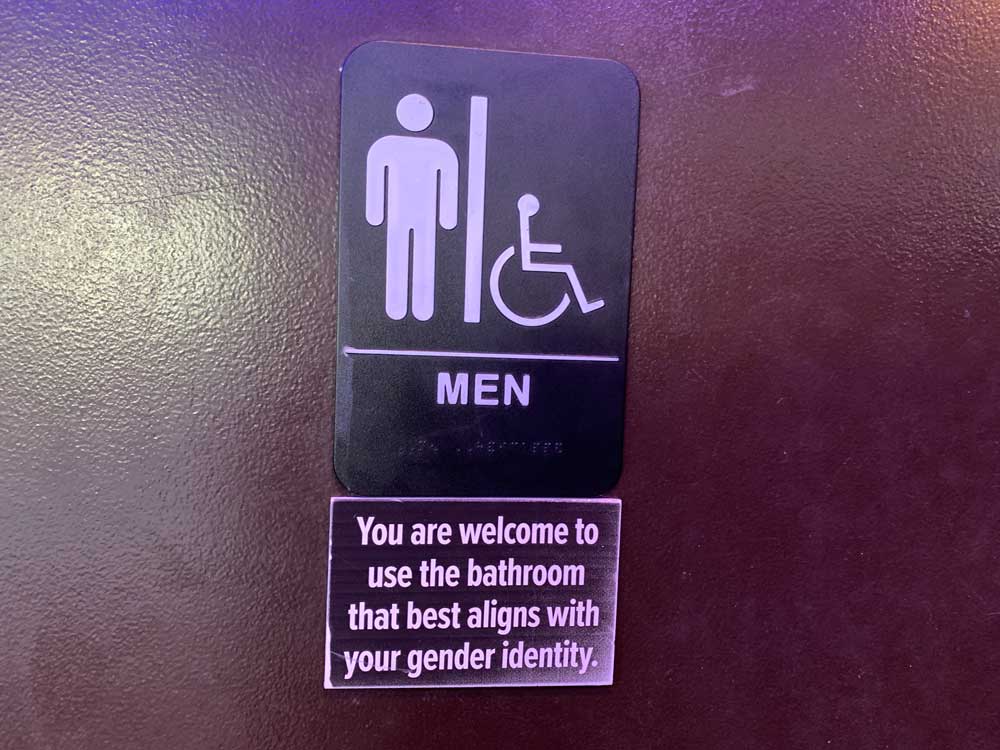
By Matteo Winkler and Marcelle A. Laliberté
Recent months have seen a dramatic shift in US policies on diversity, equity, and inclusion (DEI). These changes carry deep economic consequences. President Donald Trump’s executive orders aim to ban DEI initiatives in federal agencies and contractors, and private companies have felt pressure to weaken or drop their DEI programmes. Trump has framed what was once a corporate safeguard against discrimination as “illegal and immoral”, marking a stark reversal in legal and business norms. Federal judges have blocked some of Trump’s orders, or elements of them, and some legal processes are ongoing.
Transgender rights have become a lightning rod in this shifting landscape. The barrage of federal directives seeks to challenge – or outright eliminate – protections in areas ranging from health care to education to the military. Beyond the immediate harm to trans individuals, these policies pose threats to multinational companies that have long defended inclusive workplace values. Their leaders must now navigate a cultural minefield where staying silent risks public backlash, while openly supporting trans employees can invite legal and political complications. The business repercussions of this moral issue could affect everything from brand reputation to talent retention.

A weekly e-mail in English featuring expertise from scholars and researchers. It provides an introduction to the diversity of research coming out of the continent and considers some of the key issues facing European countries. Get the newsletter!
The economic imperative of DEI initiatives
There is a growing ensemble of research suggesting that DEI policies are not just nice-to-have but a corporate imperative. This year, the World Economic Forum reported that organizations that include DEI in their core business strategies improve performance, innovation and employee satisfaction. These findings are in line with other studies, which have consistently demonstrated that inclusive workplaces not only attract top talent but perform better financially and have higher returns on assets and net income.
With regard to people identifying as LGBTI+, a 2024 report by the Organization for Economic Co-operation and Development highlighted that inclusive policies enable LGBTI+ individuals to achieve their full employment and productivity potential, benefiting both their well-being and society at large. Moreover, according to Open for Business, a think tank whose mission is making a case for LGBTQ+ inclusion in private and public settings, companies with “larger LGBTQ+ workforce benefit from diverse perspectives but also foster environments where innovation and productivity thrive”. It has also been found that human rights violations against LGBTI+ people diminish economic output at the micro level, suggesting that inclusive societies are more likely to experience robust economic growth.
Research has also shown that trans-inclusive business practices have long been associated with innovation, employee satisfaction and market competitiveness. Companies that provide gender-neutral bathroom access, introduce the inclusive use of pronouns and support employees’ gender transitions have been proven to foster relational authenticity in the workplace.
Discrimination and exclusion, by contrast, not only harm individuals but also impede economic growth by limiting the available talent pool and reducing overall productivity. In September 2024, the American Civil Liberties Union (ACLU) reported that “laws and policies designed to restrict or prevent access or supports for transgender and nonbinary people” endanger LGBTQ+ individuals and their allies, leading to increased fear, lack of safety and a rise in anti-LGBTQ+ violence. More generally, these laws and policies can also deter businesses from investing in regions perceived as discriminatory. Also in September, the Movement Advancement Project identified that the lack of legal protection against discrimination contributes to economic instability for LGBTQ+ families, which can lead to wage gaps, job insecurity and reduced access to benefits, ultimately contributing to reduced consumer spending and lower economic participation.
Language targeting trans rights and visibility
Despite the benefits of DEI initiatives, the current US administration has sought to enact several policies aimed at dismantling them, resulting in organizations, both public and private, to suspend funding for DEI and outreach programmes. In Trump’s executive orders, anything – policy, programme or initiative – related to or benefitting trans people in access to healthcare, academic research, scientific inquiry, school policies, personal safety, participation in sports, and military service is now rejected as “gender ideology extremism”.
Targeting sports, education and the military is functional to an ideological battle aimed at erasing spaces where trans people are most vulnerable. These spaces are also formative arenas in shaping national identity and the public perception of DEI initiatives. When they become politicized, they can also affect how businesses frame their values, manage risks and engage with their different stakeholders.
The anti-trans executive orders begin by redefining the term “sex” for interpretations of federal law. According to the text of “Defending Women from Gender Ideology Extremism and Restoring Biological Truth to Federal Government”, a person is either male or female, which is determined by their reproductive cells at conception – a definition in which biology takes precedence over individual rights and legal protections. “Keeping Men Out of Women’s Sports” weaponizes this “biological truth” by threatening to cut off federal funds to schools that allow trans athletes to participate in them. “Prioritizing Military Excellence and Readiness” equates being transgender with medical or physical incapacity despite no evidence suggesting that trans service members negatively impact military readiness. “Ending Radical Indoctrination in K-12 Schooling” seeks to prevent schools from teaching about gender identity, which would strip trans youth of critical support systems. And “Protecting Children from Chemical and Surgical Mutilation” describes gender-affirming healthcare as “destructive”.
The ripple effects of this anti-trans rhetoric extend into the private sector, compelling businesses to reevaluate their DEI strategies in fear of backlash or scrutiny. Even before the last US presidential election, companies such as Ford, Harley-Davidson and Lowe’s withdrew their participation in the Corporate Equality Index, a national benchmarking tool on corporate policies and practices related to LGBTQ+ workplace equality. In the wake of Trump’s anti-DEI and anti-trans orders, organizers of various Pride events in the US and Canada learned that some corporations, including longtime sponsors, had decided not to fund them. And according to the New York Times, some companies erased language and terms related to DEI from annual reports filed this year, including Dow Chemical, whose reference to LGBTQ+ employee resource groups disappeared from its public documents.
Navigating between inclusive values and anti-DEI pressure
Three patterns seem to be emerging on how companies are navigating the tension between values that are inclusive of LGBTI+ people and the growing pressure to scrub DEI commitments within the US context. For the moment, these patterns do not reflect formalized strategies but adaptive responses to an environment that has grown in complexity in a very short time. Some corporate actions reflect deliberate strategy aimed at protecting global consistency, while others appear more reactive, shaped by local market pressures.
The first pattern involves establishing a sort of internal firewall between US and international operations. Banco Santander provides a clear example of this approach. Thus far, it has maintained global DEI commitments such as tying executive bonuses to increased gender equality in leadership. This group stated that such targets would not be applied to countries where governmental policies target DEI. In this pattern, DEI programmes are maintained abroad but are dismantled in the US to minimize political exposure in the latter.
The second approach, observed at accounting firm Deloitte, is a cultural split between US operations and those overseas: while entities under the same global brand may still share data, practices, or strategic frameworks internally, they now adopt publicly distinct positions on DEI. Deloitte UK has remained vocal on its DEI commitments, highlighting the cultural and political fault lines that multinationals must now navigate.
The third approach is a retraction of DEI altogether. Target offers a striking example. In 2023, under increased political and consumer pressure, the company rolled back some of its LGBTQ+ inclusion efforts by reducing the number of Pride-related items for sale. In 2025, four days after Trump’s inauguration, Target announced it would “end its three-year DEI goals”, cease reporting to the Corporate Equality Index and “end a program focused on carrying more products from Black- or minority-owned businesses”, as reported by CNBC. The moves resulted in considerable public criticism, and more notably, coincided with a marked drop in foot traffic – “nearly 5 million fewer visits” over a four-week period – revealing reputational and financial risks associated with the abandoning of DEI policies. By contrast, bulk retailer Costco, which said three days after the inauguration that its shareholders voted against a proposal seen as unfriendly to the company’s DEI programmes, “saw nearly 7.7 million more visits” during that same stretch.
In light of the evidence, it is clear that undermining DEI initiatives poses substantial risks – not just to human dignity, but to economic competitiveness. Businesses and policymakers must recognize that DEI is not merely a social or ethical imperative but a core strategy for growth and innovation. By fostering environments where all individuals can thrive, we unlock the full potential of our workforce and ensure sustainable economic growth.
Conversely, discriminatory policies contribute to social instability, brain drain and economic stagnation. In the United States, the rollback of DEI initiatives and the marginalization of transgender individuals threaten to erode the nation’s ability to uphold human rights and maintain business competitiveness. History demonstrates that exclusionary policies ultimately harm societies rather than strengthen them. The question remains whether the US can afford to sacrifice social stability and economic growth in pursuit of ideological battles. The evidence suggests that it cannot.
![]()
Matteo Winkler is a professor of law and finance at HEC Paris Business School. Marcelle A. Laliberté is Chief Diversity, Equity, and Inclusion Officer at HEC Paris Business School.





























Pogo says
@SMH
… in disbelief.
Stick with this to the bitter end — you’re damn near there.
Power wears out those who don’t have it.
— Giulio Andreotti
https://www.google.com/search?q=Giulio+Andreotti
JimboXYZ says
“These findings are in line with other studies, which have consistently demonstrated that inclusive workplaces not only attract top talent but perform better financially and have higher returns on assets and net income.”
I think that has more to do with the inflation, the DEI&B aspect of overhiring for organizational efficiency certainly is a contributory driver in all of it. Take the WNBA as a sports league, their best season ever for relative DEI&B & they did everything they could to sabotage the Kaitlyn Clark effect. When DEI&B isn’t on board with DEI&B when the most talented is a white female ?
Laurel says
So, tax payers flying 60 white South Africans to the U.S. and offering them a rapid pass to citizenship is anti-DEI. Gee, they sure looked like a group of poor refugees escaping terrorism. Do you think Musk had anything to do with it? Only brown and black citizens should be sent to foreign prisons, paid by U.S. taxpayers?
Republicans, stop telling me you’re not bigoted.